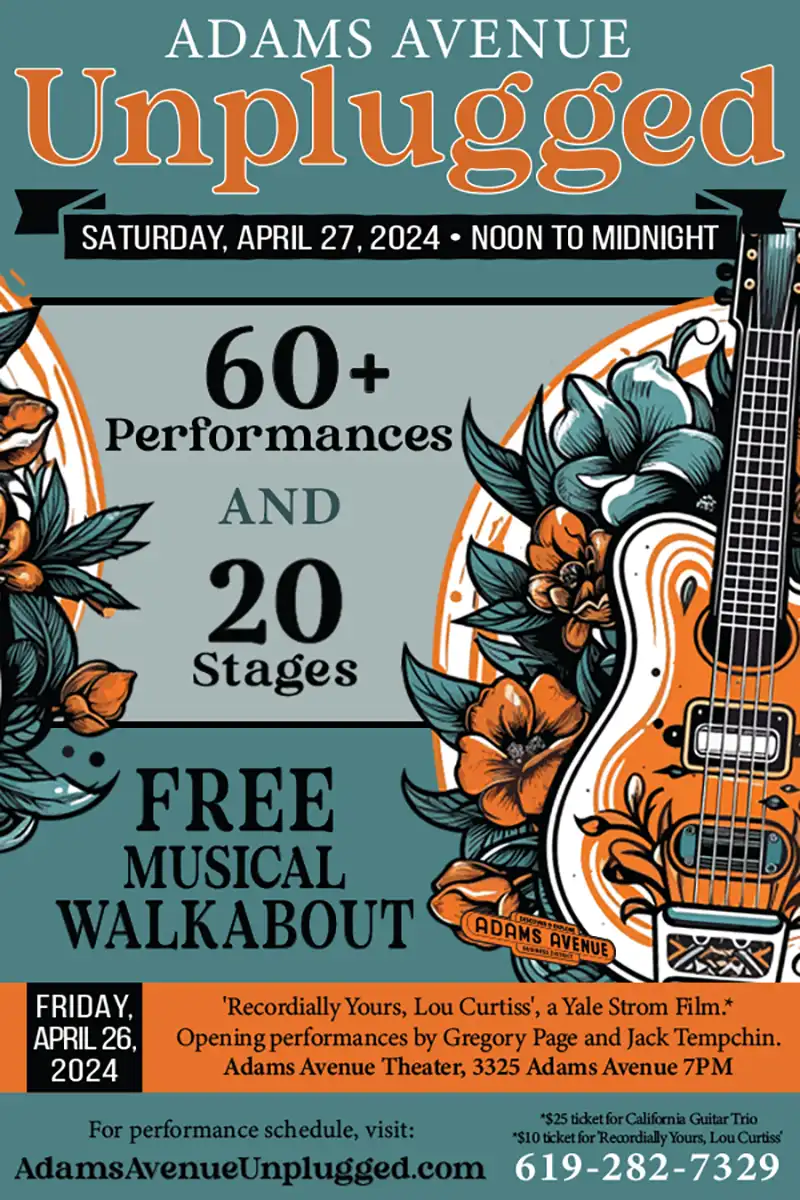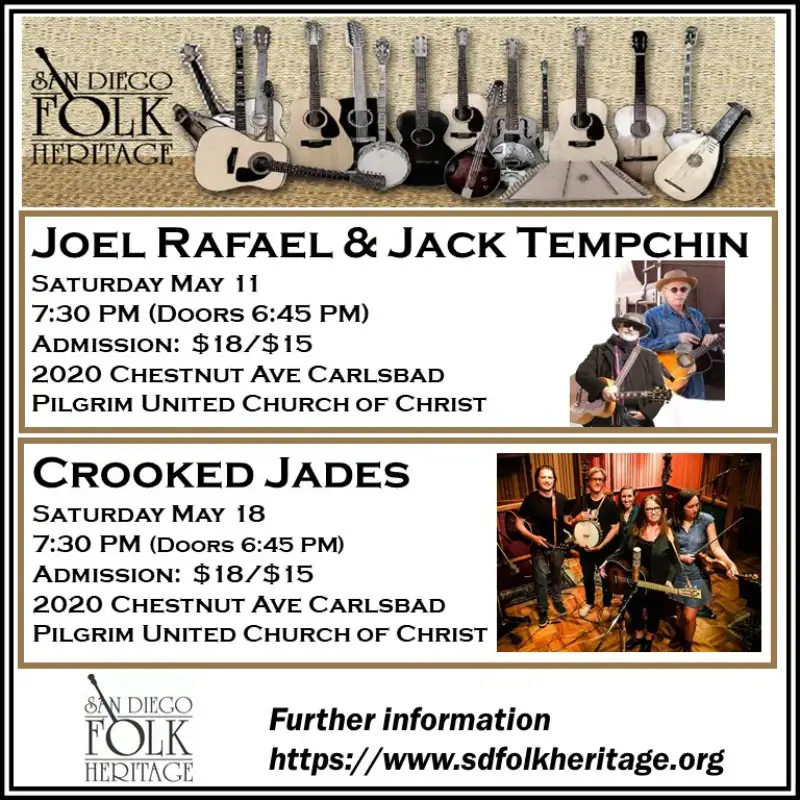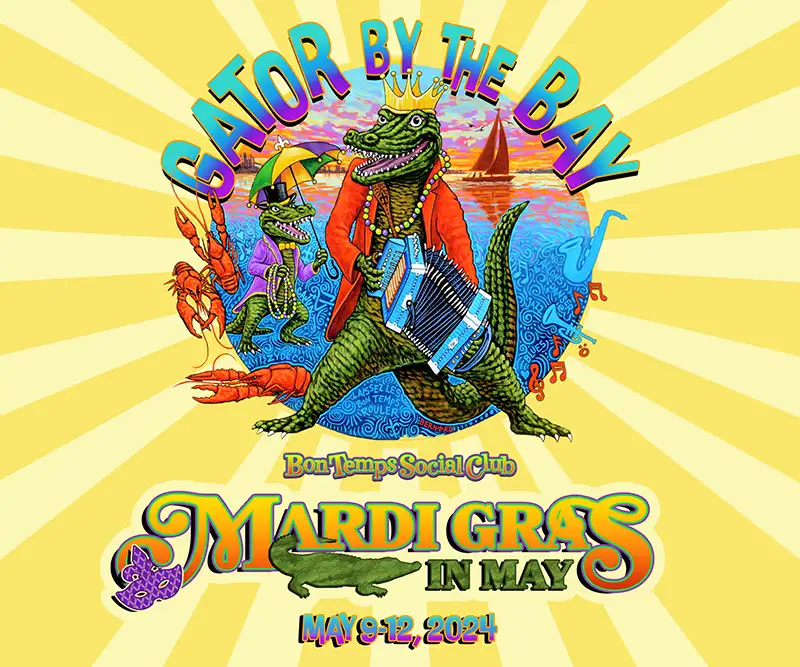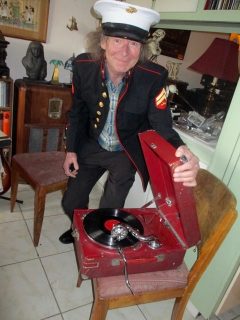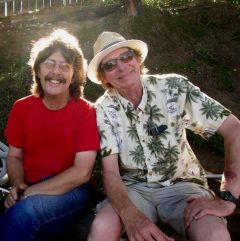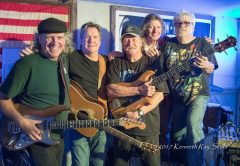Featured Stories
Wolfgang Grasekamp: A One-Man Renaissance
Many fans of local music are undoubtedly familiar with the keyboard wizardry of Wolfgang Grasekamp. The German-born musician plays a whole range of venues throughout the area, from coffeehouses, Native American casino showrooms, and popular watering holes to major music festivals like the San Diego Beatles Fair. He is an integral part of the Dave Humphries Band as well as Street Heart, a well-loved classic rock band in which he doubles on rhythm guitar. To see him in performance, one could get the mistaken impression that Grasekamp is merely a talented gigging musical accompanist. He flawlessly executes rollicking rhythms and melodic flourishes with a mostly impassive demeanor, but look closely and one will see the faintest hint of a smile on his lips and a twinkle in his eye as he plies his trade. When given the chance to solo, he is an inventive improvisor who can make even the most intricate passages look effortless. He also has a generous nature on stage, frequently eschewing the spotlight in favor of his bandmates. All of this originates from a very deep wellspring, bubbling over with the precision of his classical background, his affinity for the energy of rock music, his tireless work ethic, and his unceasing drive to create. Music runs deep in his blood, as his maternal grandfather was a church organist and his father was the first chair violinist in a German orchestra. Of his father, he asserts with humor, “He was already playing with orchestras while he still had shorts on. At 12 years old!” After being shown where the middle C was located on a piano, Grasekamp was able to figure out where the other notes were and even taught himself how to read from a written score. It was then that his formal musical training began in earnest. He confidently states, “I never had any thought about not doing music. I did not pick music. I always liked music and maybe it’s because of my heritage…where I come from. There is a liking for music in the genes.” To this day he enjoys composing and recording his own classical music, though he laments that demands on his time and energy don’t allow him to commit more fully to it.
Having been born to a generation that witnessed the rise of rock ‘n’ roll, he was enthusiastically receptive to its charms and attractions. The increasing popularity of the Beatles inspired him to pick up a guitar and join with other like-minded young musicians to form a band of their own. “We played original stuff. We did not want to do what everyone else was doing.” Yet this only served as a single outlet for his multifaceted musical creativity, because he still kept up with his classical studies. Smiling in hindsight, he remembers when a teacher even went so far as to tell him that he was playing “that evil rock ‘n ‘roll”. In 1970 he attended the Conservatory in Bremen, Germany and studied there for three years. With obvious relish, he reveals, “My teacher was a 70-year-old lady who was a student of Walter Gieseking, a famous German pianist. When Gieseking was young he took a few lessons from Franz Liszt.” This lineage of instruction served him in good stead, as he carries those lessons with him to this day. “If you study the piano at the conservatory, you don’t have a book that tells you how to move your fingers. She tells you what her teacher told her, and what her teacher’s teacher told him.” When asked if he has to adjust his approach or technique when performing other styles of music, he is very adamant in his belief that “there is a certain technique you have to use to play the piano properly for classical, for blues… all kinds of music. It’s all the same. If you are better in your technique, you can play better. There are no different techniques for playing different styles. If your technique is very good you can play anything. You can play Indian music, you can play Rachmaninoff, you can play Tom Petty. But if you don’t have the technique, you are very limited.”
All of this preparation served Grasekamp well as he embarked upon a career in music. He played in a number of rock and fusion bands while also giving piano lessons to younger students at a music school. After doing this for a number of years he sought greater fulfillment and embarked upon a lengthy tenure with Hazel O’Connor, a noted British singer-songwriter and actress. She came to prominence in the early 1980s with hit songs including “Eighth Day,” “D-Days,” and “Will You” as well as starring in the film Breaking Glass. Grasekamp recalls those days fondly, saying, “In 1989 I went to Ireland and made something like seven or eight albums [with her]. We were with Sony Music.” Their collaboration was a long and fruitful one, performing all over Europe and the United Kingdom. “I played 255 gigs in England alone. I still have the old itineraries that list every gig we played! We played her hits from the ’80s, but of course we played them differently. We always had excellent musicians. The last thing I ever recorded with her was when she came over in 2000. I was already living here [in San Diego]. She contacted me and said, ‘I’m playing at the Luna Park in L.A.’ It’s a comedy club. She was acoustic then, with a harp player. She did an entertainment show and they were singing some of her songs. So I went there and I recorded with them. It came out somehow, somewhere. That’s the last time I saw her.”
Significantly, Grasekamp was also a member of the late Tony Sheridan’s band, and this association would have far-reaching implications for him. Sheridan was an English musician who cemented his place in rock history as an early collaborator with the Beatles. Their professional relationship started humbly, with Grasekamp being called upon to provide the sound system for Sheridan’s band. He recalls, “His band came and they expected a backline. But there was no backline. The evening came and I met Tony there. I said ‘Hey, I’m the sound guy. I have to tell you something: your band was here, they saw no backline so they went to get a burger and they never came back!’ And he said, ‘I don’t care. I can play by myself.’” After an exchange of phone numbers, their friendship grew. “We always had fun—this is a crazy guy. He was really nice! So, I drove him to gigs, then I brought my keyboard and we had little gigs. Just him and me on the keyboard. We played gigs in Hamburg with a bass player and drummer. And then he said, ‘Hey…we got a gig in San Diego, California!’ The gig was for the Beatles Fair in 1999. At the last minute I changed my mind and came with him. I had to pay for my own flight. And it was fantastic. I said, ‘I want to stay here! I don’t want to go back to Germany.” Gesturing at the clear blue skies, he continues, “Look at this here. The palm trees and everything, lots of music everywhere. I met Janie and we got married 20 years ago. I stayed here though I had to go back [to Germany] once to finish a tour. Then I came back. Since then, I am here. Tony frequently came back [to San Diego] for the Beatles Fair so I put a band together with Dave [Humphries] and some other people.”
Sadly, his almost decade-long marriage to Janie, one of the local “Beatle Girls,” was cut short by her sudden and untimely passing. He observes wistfully, “I still live in the same place, except she would never allow me to put any musical instruments in the living room!”
He is also a skilled recording engineer and producer who has had a hand in crafting many musical projects inside his well-appointed home studio. Upon entering his abode it immediately becomes apparent that one is being welcomed into the realm of an obsessively creative mind. As I arrived to do this interview he was gleefully demonstrating how a Hammond organ sounded through a Leslie speaker cabinet. Bookshelves are filled with volumes about a variety of subjects, ranging from music and history to literature, art, and science. The walls are decorated with posters of his favorite artists as well as are images from his lifetime in music. And then there are the dozens of mechanical clocks. All of them are meticulously maintained and set to keep precise time. His artistic endeavors are fueled by such surroundings. “I like reading books. I read real books. Everything can inspire you. So I have certain moments in my life where I’m inspired by something and then I can do [a project] in two days. And there are other days where I’m not inspired and I just say, ‘Don’t do it right now.’ You have to have some inspiration, which happens quite often. But not all the time.”
There are some interesting anomalies to his approach. A high-tech digital studio rig sits alongside a reel-to-reel tape machine. His array of keyboards includes both electronic synthesizers as well as acoustic pianos and organs. A forest of vintage microphones lurk like potted plants in every corner. Professional-quality recordings are being made in Grasekamp’s studio, yet when his meticulous nature is pointed out, he waves off the compliment, confessing, “That may be right but sometimes not everything is completely perfect.” Indeed, it must be noted that there is very little in the way of soundproofing. When this is brought to his attention, he confidently replies, “You know what it is? If you have a totally sound-proofed room it sounds dead. We’re here in the kitchen using two microphones and you can hear the room. Sometimes it can be too much like when you record drums. But if you record vocals you would love to have the room sound like a natural environment. Not totally clean because then you’d have to put artificial reverb on it. I like the sound of the room, and for some reason this kitchen sounds perfect. The next project is going to be here in the kitchen. I’ll use the sound of the kitchen because [CLAP!] It sounds just perfect.”
The results he achieves speak for themselves. His is a one-stop shop where music is arranged, tracked, mixed, and mastered. Grasekamp seems to be happiest when it’s time to roll up his sleeves and get down to business. “If somebody wants to record here, like singer-songwriters, I like it! I can help those people with arrangements and technology. Many of those people haven’t been in a recording studio. I like to help them if I have time—I’m pretty busy with other stuff. But it works out. I like it. I could record a whole band in here. I’ve got drums… I can track everything. I’ve got enough channels and all that.” Yet he also expects his own work ethic to be matched by his clients. “If you want to come here and record your song, please learn it first, and then you can play it. Nowadays, since technology is here, you can fix everything. I have musicians here who say, ‘Okay, that’s good enough. Fix it!’ and I’m ripping my hair out. That’s why I like tape recordings. You cannot fix that. Either you play it right or not. That’s good for the music.” Dave Humphries’ most recent projects are among the recordings produced by Grasekamp and they are comparable to the output of some of the best studios in town. “When I play with Dave, we play acoustically. There’s all the magic of live acoustic players doing stuff, even if they make little mistakes! It’s even better because it’s human. Some of the music is being produced nowadays with click and artificial drum tracks. They correct the vocals with auto-pitch correction and all that stuff but I hate it! I’d rather hear a mistake and I’d rather hear something a little tiny bit out of tune. It’s human.”
Yet, it is onstage where he makes his most visible contribution to local music. With Street Heart he adds his own musicality to well-loved classic rock songs. “I do [enjoy it]. Because the band has played a long time together now, we are still liking it! Sometimes you get a good groove, and that’s not too bad! In the Beatles songs where there’s no keyboards, I play the guitar. And I like it!”
Tom Quinn, the guitarist and leader of the band is effusive in his praise for Grasekamp. “Wolfgang joined Street Heart back in 2007 and, as such, he is the newest member of the band! You may know him as the happy-go-lucky keyboard dude from San Diego Beatles Fairs throughout the years, his partnership with Dave Humphries’ band, and local recording projects from here to anywhere, but I’ll say this… We have one of the most lovable, highly trained (University of the Arts, Bremen, Germany) overqualified [for our purposes] talents in town. I’m currently listening to Wolfgang’s beautiful, original composition ‘Largo’ from his ‘Piano Concerto No 1,’ released several years ago and I still can’t believe he hangs with us! Wolfgang Rocks!”
Dave Humphries’ relationship with Grasekamp is based on a deep friendship as well as a musical common ground. He has dubbed the keyboardist/producer the “Sergeant,” and has earned an honorary rank of his own. “I am the Major, he is the Sergeant. It came about because he bought a bright red British Army jacket at a London market stall and sometimes wore it on stage, so I gave him that nickname. After that he christened me the title of Major. Maybe its because I write the songs. As far as what he brings to stage and studio, he is just so good at adding to what I’m doing musically and is a joy to play with. We have a sort of telepathic connection and any ideas we have recording-wise seem to dovetail perfectly. He can cover any style of music you can throw at him. I think he is a genius and I love him dearly.”
Grasekamp’s continued interest in finding new avenues for creative expression has led him take up video production in recent months. Thus far he has produced two music videos for Dave Humphries’ Hollywood Project. The energetic videos for “(There’s Nothing Quite Like) California” and “The Jellybean Song” are posted on YouTube, and it’s worthwhile to search for them. There is a palpable spirit of fun that perfectly captures the upbeat vibe of both tunes. While he is critical of some technical aspects of these early efforts, he finds the process of shooting and editing video footage to be stimulating and looks forward to sharpening his skills with future projects.
“I wish I could do a video of my classical music but it’s not going to happen because I have no time to go out and get the right footage.” For him, the main drawback of video production is that it is a time-intensive process, particularly at the early stages of the learning curve. He notes that people can spend days editing footage, whereas he usually can only afford to devote a couple of hours to it at a time. The many clocks on his walls are a constant reminder that time is a limited resource for any person who has the many creative ambitions of Wolfgang Grasekamp.


